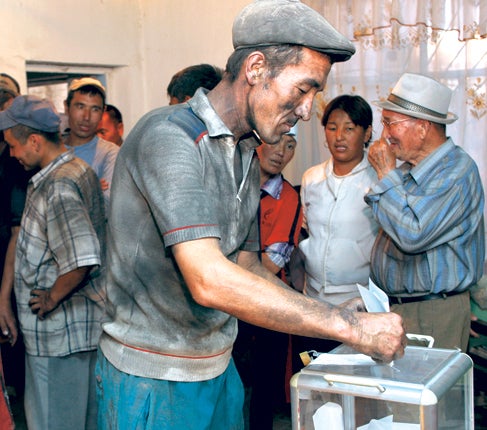Voters back democracy, claims Kyrgyzstan leader

Support truly
independent journalism
Our mission is to deliver unbiased, fact-based reporting that holds power to account and exposes the truth.
Whether $5 or $50, every contribution counts.
Support us to deliver journalism without an agenda.

Louise Thomas
Editor
Confounding observers who predicted the vote would be a catalyst for further turmoil in Kyrgyzstan, a referendum to creating Central Asia's first parliamentary democracy went calmly both in the capital, Bishkek, and in southern regions where ethnic tensions erupted in violence earlier this month.
Roza Otunbayeva, the country's provisional leader, declared last night that the voters had backed proposals for a new constitution she said would help to stabilise the turbulent former Soviet republic, which has been plagued by political and communal violence. "We believe the referendum is valid. The new constitution of the Kyrgyz republic has been approved," she said.
With more than half of all precincts counted, the Central Election Commission said almost 90 percent had voted for the new constitution and only about 9 percent rejected it. More than 2.5 million people were eligible to vote, and turnout was 65 percent, it said.
The changes mean executive powers will now be devolved from the office of president to a prime minister, ushering in parliamentary rule, which Ms Otunbayeva's interim administration says will establish democracy. She said she would now be inaugurated as a caretaker president until parliamentary elections on 10 October."It will not be an interim but a legal and legitimate government," Ms Otunbayeva said. "We are leaving the word interim behind."
Ms Otunbayeva, a former ambassador to Britain who came to power in April when President Kurmanbek Bakiyev was toppled, travelled earlier in a heavily guarded convoy to Osh, the damaged and divided city 300 kilometres south of Bishkek which was the scene of the worst turmoil, to cast her vote. There she called for unity to overcome the challenges facing a country in shock from the scale of the violence. "Kyrgyzstan is a country with a great future, but today, due to many circumstances, the country is experiencing major difficulties," she said. "The unity and solidarity of the nation will help overcome them. I am convinced the country will definitely get on its feet and move forward."
Picking up the pieces will be a challenge, and many in the Uzbek neighbourhoods that bore the brunt of the attacks distrust the interim government which failed to step in and prevent them. Leaders say they were powerless to intervene. While the Kyrgyz and Uzbek communities in Osh trade accusations of responsibility for the violence, the government blames terrorists and supporters of Mr Bakiyev, who denies the accusations.
As Ms Otunbayeva voted, an Uzbek family was surveying the wreckage of their house in the devastated Uzbek neighbourhood of Cheremushki. Jamilya Atajanova described how she hid her two children in the cellar as a group of Kyrgyz men threatened the family with guns and a pitchfork and looted their possessions, down to the gold earrings in the women's ears - and the identity documents that would have allowed them a say on the new constitution. "I didn't vote. I've got no documents," Atajanova said. "They've stolen everything."
Other ethnic Uzbeks refused to vote, voicing a sense of exclusion from the political process amid disappointment that the new constitution does not guarantee greater representation for ethnic minorities in decision-making bodies. "What interest do I have in the vote? It's not even for us," said 58-year-old Rakhim Saidov.
But many did head for the polls despite predictions that Uzbeks would boycott in protest against the violence, with those casting votes overwhelmingly citing a desire to bring stability to their fragile state. "Of course I voted for the constitution," said Uzbek Israil Abdrakhmanov as he left a polling station in the centre of Osh. "The main thing is peace."
"We want to live in peace," echoed Odina Yuldasheva, an ethnic Kyrgyz market trader who had just voted in favour of the constitution at the same polling station. "If we don't have a constitution there will be chaos in the country."
Subscribe to Independent Premium to bookmark this article
Want to bookmark your favourite articles and stories to read or reference later? Start your Independent Premium subscription today.
Join our commenting forum
Join thought-provoking conversations, follow other Independent readers and see their replies
Comments